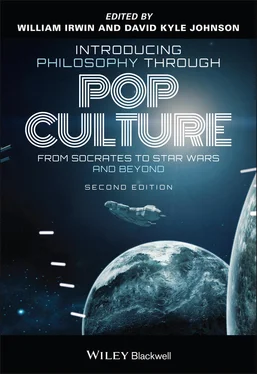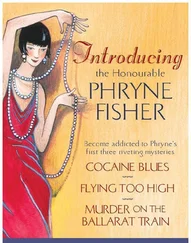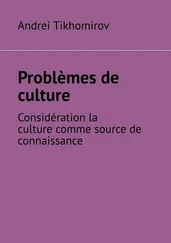1 ...7 8 9 11 12 13 ...34 Thinking, for Arendt, is a twofold process: it involves seeing things through another's eyes, in dialogue and reflection, as well as asking what you can live with for yourself. It is, then, both an internal and an external dialogue, and it is only through this dialogue that critical reflection and goodness become possible. Whereas Eichmann and Cartman do not critically reflect upon the consequences of actions, nor put themselves in another's shoes, thoughtful dialogue makes us attentive to others around us, lets us live with them, and helps us attend to our own goodness. Such dialogue allows us to live with ourselves – even when, like Socrates or those who resisted the Nazis, this means we must die.
Of course, in the town of South Park there is no Socrates to teach philosophy or help us engage in dialogue. Surrounded by ignorance and violence, the boys are on their own. While the four are friends, South Park makes a compelling point about philosophy and ethics through the particulars of the friendship of Kyle and Stan. For instance, in “Spooky Fish,” where the “evil” Cartman (who is good) arrives from a parallel universe, an evil Kyle and Stan arrive together . Their friendship – thinking from one another's perspective – is what helps them to be good, both for themselves and for others. In Arendt's words, to live well is to “be plural,” so that the good life is never simply one's own. 10 This is probably why Plato wrote about important philosophical issues in a dialogue format, so that it becomes clear that debate and discussion of ideas is essential to any intellectual and moral growth.
For all their faults, Kyle and Stan still debate and discuss whether certain actions are wrong. On his own, Stan sometimes just goes along with the crowd, though his early refusal to kill a deer grows into a general refusal to do harm over the show's history. 11 After the boys toilet paper the art teacher's house, Kyle cannot live with what he has done. Through their conversations they learn goodness and engage in the “thinking” Arendt describes. Friendship, then, helps us to examine our lives. In the episode “Prehistoric Ice Man” Larry says that “living is about sharing our ups and downs with our friends,” and when we fail to do this we aren't really living at all. If thinking and goodness only arise through real dialogue with others – through critically questioning and examining our own views – then we need more friendships like the one Kyle and Stan share.
An Apology for South Park : Getting in Touch with Your Inner Cartman
If friendships help us to critically examine the lives that we lead, then perhaps it's no accident that the critical voice of South Park has been created by two friends – Trey Parker and Matt Stone. In the Apology Socrates likens himself to a gadfly , an annoying pest that goes around “stinging” people with his challenging questions and critical reflections so as to keep them intellectually awake and on their toes. South Park , too, serves as a gadfly, trying to wake American culture from its thoughtlessness and ignorance. The show generates discussion and debate and leads many people into discussions of ethical issues that would otherwise be passed over in silence. For a show that supposedly corrupts, it has far more of a focus on religion, ethics, and democracy than its critics would like to admit. But of course we could still ask if the way that South Park presents these issues is really necessary. For example, is it philosophically wise and necessary to use the word shit 163 times in one show? Or have so much, farting, vomiting, and violence? What philosophical goal can such vulgarity serve?
The vulgarity and crudeness of South Park are often defended on the grounds of free speech. However, a different issue is also in play. South Park often says what is not socially or morally acceptable to say – what, in Freudian terms, must be repressed. According to Freud, our thoughts and actions are shaped by what he calls “drives,” examples of which include emotions, desires, and energy that can be aggressive, hostile, and consumptive. (Freud would have a field day with Cartman's twisted little mind, on this score.) These drives are part of our embodied being, yet, since they are dangerous and often violent, we try to control or even silence them. This control is a form of repression, but it can often have unintended consequences. Repression of a drive can lead to other sorts of unconscious, violent behavior, and such suppressed wishes form the content of dreams, our “unconscious” life. 12 Repression, as a form of internal censorship, redirects but does not diminish our aggression. In spite of our intentions, this unconscious aggression often shapes who we are, how we think, and what we do.
What Freud discovered with psychoanalysis was that talking out and interpreting our dreams may serve as a way to address this repression and its associated violence. When we talk these ideas and feelings out, the repression is broken and, through the realization, we can come to terms with the desire and shape it through thinking. Representing desires lets them be ex pressed, and this helps us to integrate them into the structure of our lives. 13 By bringing to light what had been unconscious, dream interpretation lets us think through these aspects of ourselves.
Freud thought that jokes work much like dreams. When one person tells a joke, its spontaneous and unexpected word form breaks through another person's repression. Laughter is a “release of energy” that has been blocked because we have tried to repress the wish or drive; this is why many jokes have a vulgar or obscene dimension. As Freud points out, the one who supplies it has to deny it – jokes only really work when the person telling them doesn't laugh, so that the surprise can make others laugh. 14 There is pleasure in laughing at the joke, and in telling it, as well as pleasure in freeing others from their repression.
Through its vulgarity, South Park verbalizes the drives and desires that we often repress; and it allows us to laugh so as to reveal these inhibitions. This is what makes the show's crudeness essential. By showing us “Token” or the conjoined fetus nurse, or saying shit over and over, it brings out the aggression and desire that we feel we cannot express. And, for things that really shouldn't be said, Kenny says them in a muffled way, and the other boys comment on it. By verbalizing these drives, the show lets us begin to think these through – it makes it possible to analyze them, and thereby distance ourselves from them. For instance, many episodes address how outsiders are berated and subjected to racist or xenophobic slander. However, by working through these statements, the show argues that in many cases, such slander is used among friends as well – and that such verbal sparring, when so understood, need not lead to violence or exclusion. It doesn't justify such speech, but it does create a space in which the hostility can be interpreted and analyzed.
Likewise, one can analyze all of the farting on Terrance and Philip . At least two interpretations of this show‐within‐the‐show are possible. First, there is the issue of why the boys love such a stupid show so much. It's not that they wish they could fart all the time. Rather, when they fart, Terrance and Philip do what is forbidden: they transgress the parents' social prohibition. This appeals to the boys, because they wish they too could be free from parental control and regulation.
Second, regular viewers (mostly my students) have noted that Terrance and Philip is self‐referential, a way for South Park to comment on itself. The opening of South Park tells us that, like Terrance and Philip , the show has no redeeming value and should be watched by no one. The stupidity and vulgarity of the cartoon is better understood, however, if we look beyond South Park . Is Terrance and Philip really more vapid, crude, and pointless than Jerry Springer or Wife Swap ? Is it more mindless than Fox News , The 700 Club , or Law and Order ? Some would say no. When we see Kyle, Cartman, Kenny, and Stan watching Terrance and Philip , it shows us that television fulfills our wish for mindlessness. What offends the parents in South Park, and the critics of South Park , is not that the show is vulgar and pointless, but that it highlights the mindlessness of television in general.
Читать дальше












